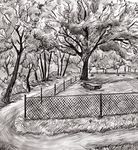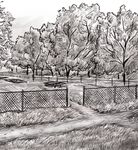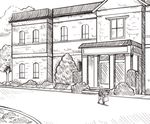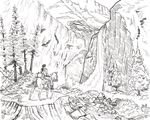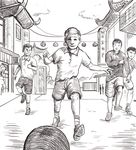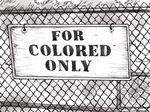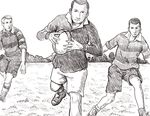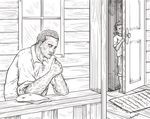Level Four WORLD BIOGRAPHIES - For use with the Level 4 Language Arts and Literature course
←
→
Page content transcription
If your browser does not render page correctly, please read the page content below
Table of Contents Faithful and Fast: The Eric Liddell Story.............. 1 Jesse Owens: A Story of Triumph........................ 25 The Tennis Twins...................................................47 Clare Marie Hodges............................................... 77 Treasures at My Fingertips: A Story of Louis Braille......................................................95 The Amazing Story of Franklin Ramón Chang-Díaz.......................................................175
Chapter 1
From Bravery to
Excellence
“Have not I commanded thee? Be
strong and of a good courage; be not
afraid, neither be thou dismayed:
for the Lord thy God is with thee
whithersoever thou goest.”
E ric Liddell recited these words from Joshua 1:9
to himself. He needed to be brave because today
was the first day of school for six-year-old Eric. He
was going to attend Eltham College, but this school
wasn’t a college in the modern sense. It was actually a
boarding school!
Eric’s parents and his sister, Jenny, were headed back
to China, where Eric had lived most of his life, but Eric
knew he would live at Eltham College for years and so4 Faithful and Fast
would his eight-year-old brother, Robert, so he needed
courage.
Despite his internal promise of courage, Eric felt
homesick shortly after he arrived. London was as far
from home as he could imagine; he was on the other
side of the world now.
You see, Eric was born in China, and his parents
were from Scotland. That meant he had no family orFrom Bravery to Excellence 5
home anywhere near his new school!
China had been a wonderful place to live. Eric’s
parents were missionaries who worked for the London
Missionary Society, and they were quite famous for
their work. The people in their community in China
also treated them with kindness and respect. Life for
the Liddell family had been blessed so far.
As Eric sat at his new school, he remembered how
excited he had felt a year
ago when his dad received
a furlough ([FUR–low],
a temporary break from
work). This break allowed
Eric’s family to visit extended
family in Scotland, and the
minute Eric’s family arrived in
Scotland, Eric fell in love with
his homeland. It was beautiful
and so different from China!
The plants were different,6 Faithful and Fast
the people were different, and even the colors he saw
everywhere were different—the Scottish landscape
was much greener than where they had lived in China!
He enjoyed the year he spent in Scotland with his
grandparents before coming to the school.
After reflecting on his wonderful memories of
Scotland, Eric stopped thinking of the past and lookedFrom Bravery to Excellence 7 foward to his future at the boarding school. He was going to get an education, and he decided to make everyone proud in the process. He never forgot his love for China and promised himself he would one day return to China and work as a missionary there with his father. On the first day of school, Eric headed into the class, ready to meet his new friends and teacher. And wouldn’t you know it? Eric actually had a great time at his new school! His classmates loved to hear stories about China, a place that seemed foreign and exotic to
Chapter 1
The Prayer
H enry Owens fell to his knees on the hard
wooden boards of his front porch, his work-
worn hands lifted to the heavens. Tears streamed down
his face as he moaned and begged God to spare his
son’s life. James was dying. And if James died, Henry
knew his beloved wife, Emma, would not survive the
grief.
Henry’s prayers were interrupted by a shuffling
scuttle that came from the front door just behind
him. There he saw five-year-old James, or J.C. as they
all called him, his last-born son and the apple of
Emma’s eye. Maybe it was because he was the baby
of the family, or maybe she saw a glimpse of the man28 Jesse Owens
he would become someday, but Emma loved James
and would have gladly given her life to spare his. J.C.
walked painfully forward, not knowing exactly what
was going on but sensing it was about him somehow.
The white bandage at his chest was stained with blood,
blood that had not stopped flowing for three days.
Henry, tears still freely streaming down his cheeks,
held out his hand to his son and whispered, “Pray, J.C.
Pray that God will heal you and spare your life. This
family needs you.”
Then J.C. understood. He remembered findingThe Prayer 29 the lump on his chest, and how it grew and made it difficult for him to catch his breath. He remembered his daddy hopelessly saying that God had every right to take J.C. home if he wanted him. Finally, he remembered his mama and that fierce look of love and determination in her eye. They were too poor to afford a doctor, but she would not let her son die if she could save him. With a knife in her hands, she had cut that terrible growth off him. But try as she might, she could not stop the bleeding. But God had big plans for James Cleveland Owens, and his body would need to be whole and strong to accomplish the mission He had for him. That night, while the stars shone down on the ramshackle cabin, God heard Henry’s prayers for his son; within minutes, the bleeding finally stopped.
Chapter 1
Two Sisters
E very time a child is born, an important story
begins. Every person’s story is fascinating in some
way, whether the world knows the story or not.
The fascinating story in this book is not the story
of just one child; it’s the story of two sisters who
were born in 1915 and 1917, over one hundred years
ago. Born just two years apart, these sisters were
named Margaret and Matilda Roumania Peters,
and they would one day be tennis superstars, but
more importantly, they would also become kind and
hardworking women.
As children, Margaret and Matilda lived at a home
on O Street in Georgetown, a neighborhood in
Washington, DC.
Margaret and Matilda were like two peas in a50 The Tennis Twins
Two Sisters 51 pod, always enjoying being together and sometimes mistaken for twins. For their entire lives, they would remain very close friends. Nearly every day they played at Rose Park, which was not far from their home in Washington, DC. The sun laid lacy patterns of shadow on the grass, just as it did in all the parks in the city. The melody of birds filled the air, just as happened in all parks in the city. One thing, however, was different about this park—there were no white children at the park. This is because the country at that time was segregated. African Americans could not go to the same schools, parks, movie theaters, libraries, or restaurants as white people. There were even different drinking fountains for whites and African Americans. It is a very, very sad part of history. Rose Park would end up playing not only a huge part in Margaret and Matilda’s amazing story, but also in the amazing story of dissolving segregation. Something very interesting happened at Rose Park. White children started playing there. Happily, white and black children laughed and ran and played, not
52 The Tennis Twins
caring about skin color.
Not everyone was happy about that, however. A sign
was put on the park gate one day. It said “For Colored
Only.”
The neighborhood protested, and the whites andTwo Sisters 53 African Americans continued to play together. In fact, adults and children of different colors played basketball and dodgeball together. They held folk dances and taught crafts. In 1949 Rose Park became part of an official,
54 The Tennis Twins
successful experiment in nonsegregation; it helped
others to see that segregation should be ended.
Segregation would not end until Margaret and
Matilda were quite grown up. For example, restaurants
were not desegregated until 1953, when Margaret was
39 years old. The Civil Rights Act of 1964 finally ended
segregation in all schools in the country. At that time
Matilda had a six-year-old son, her first child, just the
age to be starting school.
But before segregation officially ended, Rose Park
contained something that would change the lives ofTwo Sisters 55 the Peters sisters: a tennis court. It was rare for African Americans to have access to tennis courts at that time because most of them were only for white people. The Rose Park tennis court would prove to be a big blessing for little Margaret and Matilda. The tennis court in Rose Park was made of clay, and it caught the attention of the sisters when Margaret was about ten years old. No one is really sure when or where tennis originated, but some people think it was in France. We do know that for hundreds of years people did not hit the ball with a racket; rather, they hit the ball with the palms of their hands! Researchers claim there is evidence of tennis playing in Ancient Greece! The game was known as lawn tennis for a very long time (and still is in some places) because it was played on grassy courts. You can play tennis with singles (two opposing people, one on each side of the court) or with doubles (two pairs of players, one pair on each side of the court).
CHAPTER 1
N ightfall had already come. The quiet thud of
her horse’s hooves seemed in harmony with the
chorus of crickets that filled the air with their rhyth-
mic chirp-chirp. Chirp-chirp. Her ears were tuned in
to every sound of the forest, for her survival may have
depended on it. There was no way to know what—
who—may be lurking in the shadows. The other rang-
ers had told her to carry a gun for protection—that
every ranger carried one—but she had refused. Al-
though she transported a fair amount of money many
nights, she had never felt a need for a weapon. Even in
the dark, she knew the terrain well, having traversed
it dozens of times, both day and night. Confident in
her wilderness survival skills, she was not afraid of the
wild.80 Clare Marie Hodges
There was plenty of time to think during her long
night rides from Tuolumne [too–AH–lum–nee]
Meadows to the superintendent’s headquarters at Yo-
semite Valley, a 34-km (21-mi) journey on horseback.
That night she was irritated by something that had
made its way back to her from a Massachusetts news-
paper. Reporters had recently come from several states
to interview her—the first woman ever to be hired as
a National Park Service ranger. One wrote, “She has
nothing to do except wear her khaki riding habit—and
lope all day through the forest aisles, over lily-decked
meadows, past thundering waterfalls, along foaming
torrents, on ledge trails overlooking dizzy cliffs, with a
glittering chain of snowy peaks in the background.”
“I’d like to see them do what I do—work 16-hour
days, sleep out in the open on the hard ground, some-
times in the rain, fending for myself,” she thought
angrily. But as she continued to muse about the moun-
tainous forest she loved and the sheer magnificent
beauty of it all, she smiled. “But they aren’t entirely
wrong,” she said aloud.Clare Marie Hodges 81 Clare Marie Hodges recalled her first time riding on horseback into the Yosemite Valley with her parents in 1905. It had taken their family trio four days to jour- ney entirely on horses to the magnificent place. “Clare, look at this.” She could still hear her fa- ther’s voice explaining all the rock formations along the way, and she could still see him pointing out the flowers and plants and teaching her about the use of each one. At fourteen years old, half her current age, the resplendent beauty of Yosemite National Park had
82 Clare Marie Hodges
been emblazoned in her memory. The mountain val-
ley glistened with streams and small lakes, smelled
of heavenly pine and cedar, and boasted stunning
mountain formations carved out by glaciers. Then
there were the waterfalls. She had never seen, heard,
or felt anything like them. Yosemite Falls demanded
the attention and reverence of all who gazed upon
them. The falls were a stunning torrent, dropping over
730 m (over 2,400 ft), and were framed by majestic
granite cliffs. Clare remembered the crashing sound
that surrounded her as it reverberated off the steep
granite walls, and as she had gotten close enough, she
had been cooled by the energetic mist that enveloped
everything at their base.
Suddenly a great gray owl hooted its acknowl-
edgement of her as she passed by. Startled out of her
thoughts, she looked up. The owl remained hidden,
but she could see the acrobatics of bats as they dove
and swooped through the moonlit air, catching their
dinner of mosquitoes and moths. Mule deer were
frequent fellow travelers. She had also seen an occa-Clare Marie Hodges 83
sional wolf on the prowl. Coyotes could be heard some
nights, howling and yipping back and forth like rowdy
glee club members.
No, there was no doubt Clare loved Yosemite. After
that first trip with her parents, she had returned sever-
al times. In 1913 she went at least five times, and, filled
with inspiration, she wrote a poem about her travel
that was published the following year in the Pacific
Short Story Club Magazine.
The Land of Wandering
O, the mountains call and I feel their thrall,
And into the saddle I swing,
For keenest love ’neath heaven above
Is the love of wandering.
Where the grey cliffs rise to the blue of the skies,
And freedom and rest they bring,
Past the sparkling lake where ripples break
Lies the Path of the Wandering.
Up the winding trail over cliffs of shale84 Clare Marie Hodges
I laugh as I gaily sing
For the purest joy without alloy
Is the joy of wandering.
Out there on the rim of the mountains grim
My cares to the winds I fling,
And I fain would go through sun and snow
To the Haunts of the Wandering.
And in my ear the calls I hear,
And the roving thirst they bring,—
So it’s up and away to the hills today
To the Land of the Wandering.
Clare continued to visit Yosemite five to six times
a year after that before finally deciding she wanted to
move there, which she did in 1916. She began teach-
ing at the Yosemite Valley School. Her students were
the children of rangers, other government employees,
and Native Americans. The Native American children
brought her wood carvings they had made. “Beauti-Clare Marie Hodges 85 ful!” she would exclaim, delighted. “Will you teach me how?” The children would nod happily and sometimes stay after school to teach Miss Hodges the art of wood carving.
CHAPTER 1
R eady! Ten, nine, eight, seven, six, five, four, three,
two, one, zero! BLAST OFF! Plchkshhhhhhh!”
Franklin sprayed the air with his robust sound of the
rocket engine, launching himself and his two friends,
Pablo and Juan, into space.
“Oxygen! Good!” reported Pablo.
“Speed! Good!” exclaimed Juan.
“Jupiter, here we come!” announced Franklin.
The boys lay in a row, each on a kitchen chair tipped
on its back, their feet in the air. Their hands actively
pushed buttons and knobs drawn with crayons within
the walls of their cardboard rocket ship. Papá had
brought home an oversized cardboard box, knowing
full well what Franklin would use it for. Ever since
the family had watched the satellite Sputnik blast178 Franklin Ramón Chang-Díaz off into space, Franklin could scarcely think or talk of anything else. The whole world suddenly seemed captivated with the possibilities of space travel. From that moment Franklin decided he would be a space explorer. A couple years earlier, when Franklin was only five years old, he woke in the middle of the night and roused his little sister, Sonia Rosa. The six siblings all slept in the same small room together, so Franklin and Sonia Rosa crept out quietly. He took his three-year- old sister by the hand, and the two of them climbed a ladder that led to the cinderblock roof of their small San Jose, Costa Rica, home. Once on the roof, they
Franklin Ramón Chang-Díaz 179 watched to be sure there were no geckos or iguanas underfoot. Rain was a frequent visitor to their home, but that particular night, the moon and stars shone down brightly. Their soft glow lighted the rooftop, and the children could see dim shadows from the nearby banana trees. The constant call of the red-eyed tree frogs filled the warm, humid nighttime air. “Ribbit! Ribbit! Croak!” resounded and echoed all around them. Franklin plucked a ripe grapefruit from the citrus tree that lightly brushed their roof. He and Sonia Rosa sat down as Franklin pulled a small paper bag from his pocket. “What is it?” Sonia Rosa asked. “I will show you.” Sonia Rosa was delighted when Franklin sprinkled something into her palm. “Sugar!” she exclaimed as she licked the sweet crystals from her hand. She held it out for more. “Not yet. It’s for the grapefruit.” Franklin smiled
180 Franklin Ramón Chang-Díaz as he began peeling the fragrant yellow skin. Then section by section, the two shared the dripping, pink, fleshy fruit, dabbing each bite into the sugar. The two of them giggled with delight. “Look at all the stars,” Franklin mused as they gazed up into the sky. “And the moon. I wonder how far away they are. What are they made of? Look how the stars sparkle. The moon looks like a white ball.” “I think it looks like cheese.” Sonia Rosa smiled happily. There were too many stars to count. Some were really bright; others were tiny pinpricks of light, filling the tranquil sky.
Franklin Ramón Chang-Díaz 181 Franklin sat staring upward a long time until he felt Sonia Rosa’s head bobbing against his shoulder. “I want to go up there,” Franklin said dreamily as he led a sleepy little sister back to bed. Almost every day, if he wasn’t pretending to be a space explorer, he was asking his father and mother endless questions about rockets and space exploration: “Papá, do you think people will ever go into space?” “No, Son, that’s just in the movies.” “But if a rocket can go into space, couldn’t a person go inside of the rocket?” “Some people seem to think so. Since the Germans figured out how to launch missiles in the war [World War II], all the talk is about sending people into space. It’s been ten years since the end of the war. The Russians were the first to send a satellite on a rocket, but no one has sent a human yet,” said Papá thoughtfully. “I’m going to be a space explorer!” Franklin announced proudly. “Do you think I could, Papá?”
182 Franklin Ramón Chang-Díaz His father rubbed his chin thoughtfully then smiled. “You can be anything you want to be, Son.” Franklin was not the smartest student at school. He was an average kid with average grades, but he had a dream that he could not—would not—let go of. He knew he would go to space someday.
You can also read

